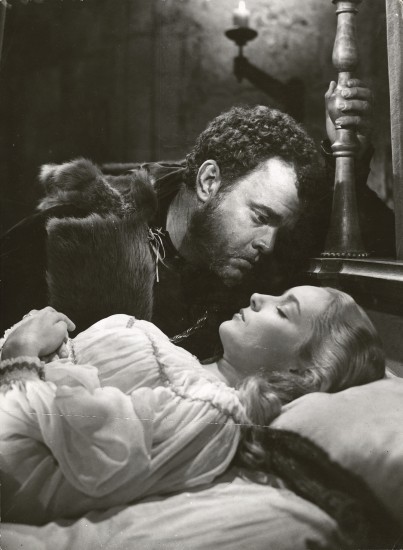
Orson Welles’s OTHELLO kicks off Film Forum series commemorating the four hundredth anniversary of the death of the Bard (courtesy Carlotta Films)
OTHELLO (Orson Welles, 1952)
Film Forum
209 West Houston St.
Wednesday, January 13, 12:30, 4:40, 9:15
Series runs January 13-21
212-727-8110
filmforum.org
www.carlottafilms-us.com
 Film Forum follows up its two-week presentation of the restored version of Orson Welles’s spectacular Shakespearean adaptation, Chimes at Midnight, by kicking off its commemoration of the four hundredth anniversary of the death of the Bard, “Stratford on Houston,” with Welles’s Othello and the director’s cut of his Macbeth on January 13. Filmed in black-and-white over three years in multiple locations and ultimately employing five cinematographers, four editors, three Desdemonas, and two scores, it’s rather amazing that Welles’s 1952 independent production of William Shakespeare’s Othello was ever completed — of course, many Welles projects were not. That the final work turned out to be a masterpiece that won the Palme d’Or at Cannes speaks yet more to Welles’s genius. Welles, who directed the picture and plays the title character, streamlined the story into ninety-five minutes, getting to the heart of the most intense tale of jealousy and betrayal ever told. The film opens with shadowy shots of the dead Othello and his deceased wife, Desdemona (Suzanne Cloutier), carried aloft on biers at their dual funeral, to the sounds of an ominous piano and a mournful vocal chorus. The credits soon follow, after which Welles returns to the beginning, as the villainous ensign Iago (Micheál MacLiammóir) plots with Roderigo (Robert Coote) to convince Othello that his loyal and devoted wife is actually in love with the heroic soldier Michael Cassio (Michael Laurence).
Film Forum follows up its two-week presentation of the restored version of Orson Welles’s spectacular Shakespearean adaptation, Chimes at Midnight, by kicking off its commemoration of the four hundredth anniversary of the death of the Bard, “Stratford on Houston,” with Welles’s Othello and the director’s cut of his Macbeth on January 13. Filmed in black-and-white over three years in multiple locations and ultimately employing five cinematographers, four editors, three Desdemonas, and two scores, it’s rather amazing that Welles’s 1952 independent production of William Shakespeare’s Othello was ever completed — of course, many Welles projects were not. That the final work turned out to be a masterpiece that won the Palme d’Or at Cannes speaks yet more to Welles’s genius. Welles, who directed the picture and plays the title character, streamlined the story into ninety-five minutes, getting to the heart of the most intense tale of jealousy and betrayal ever told. The film opens with shadowy shots of the dead Othello and his deceased wife, Desdemona (Suzanne Cloutier), carried aloft on biers at their dual funeral, to the sounds of an ominous piano and a mournful vocal chorus. The credits soon follow, after which Welles returns to the beginning, as the villainous ensign Iago (Micheál MacLiammóir) plots with Roderigo (Robert Coote) to convince Othello that his loyal and devoted wife is actually in love with the heroic soldier Michael Cassio (Michael Laurence).
At first Othello brushes away Iago’s concerns, but soon he is caught in Iago’s trap and starts to question the fairy-tale love he shares with his beautiful and trusting bride. As the story proceeds, characters are shown in extreme close-up, in narrow passages and doorways, amid medieval rooms with large columns and intricately designed windows, shadows looming everywhere; the stunning architecture, shot at disorienting angles, is a character unto itself. Welles did whatever it took to finish the film, including using his own funds from acting jobs and filming a scene in a bathhouse when costumes were unavailable, lending the proceedings a fragmented feel that evokes the mirrors in the finale of The Lady from Shanghai. Unfortunately, the syncing of the dialogue track is still often off and numerous cuts are too shaky, but they detract only a bit from the overall power and majesty of the film, a bold and brave take on a familiar Shakespeare tale given a dark new life by a master auteur. “Stratford on Houston” continues through January 21 with such other Shakespeare and Bard-related films as Laurence Olivier’s Hamlet, Richard III, and Henry V, Fred McLeod Wilcox’s sci-fi classic, Forbidden Planet, Franco Zeffirelli’s Romeo and Juliet, and Roman Polanski’s Macbeth.